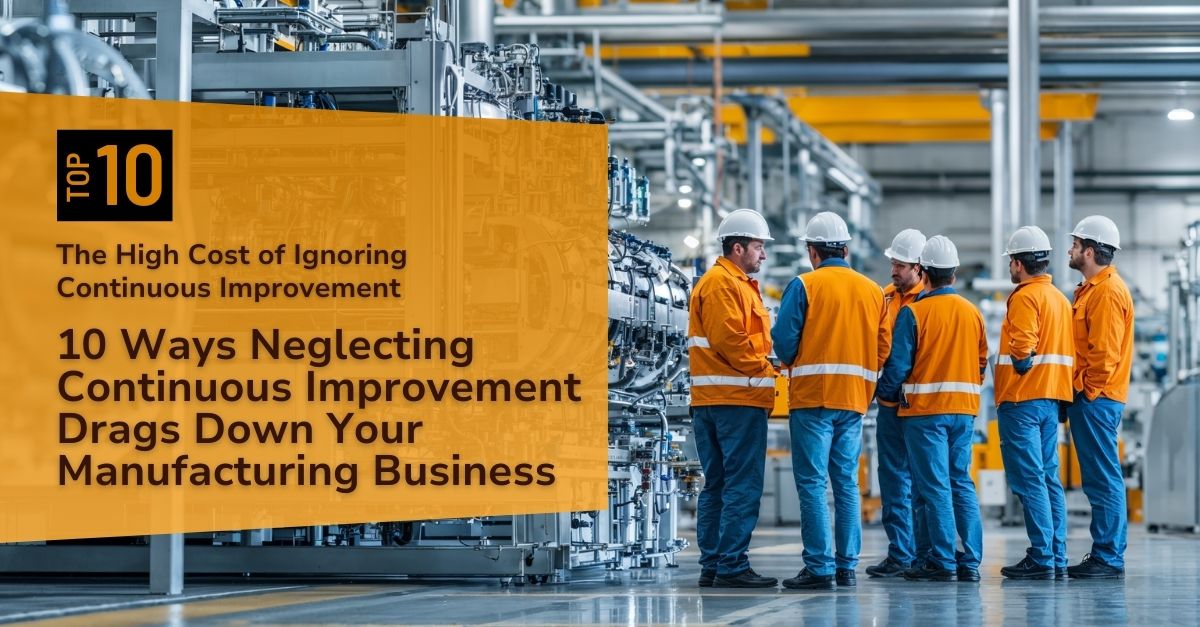
Achieving consistent performance and profitability in manufacturing doesn’t happen by chance. It requires clear priorities, structured systems, and a commitment to ongoing improvement. Shop Floor Excellence (SFE) is a proven framework for aligning people, processes, and technology to drive sustainable results across all areas of operations.
This approach goes beyond hitting production targets. It helps manufacturers create an environment where problems are identified and resolved early, employees are engaged, and work is executed safely and efficiently every day. Over time, SFE becomes part of the operating culture helping teams anticipate challenges instead of reacting to them.
Below are the 10 Pillars of SFE the foundational elements that support reliable performance and long-term competitiveness.
The 10 Pillars of Shop Floor Excellence
1Continuous Improvement:
A culture that consistently looks for ways to solve problems and remove waste. Teams regularly assess processes, address recurring issues, and act on feedback to keep performance moving forward. For example, daily huddles can help teams share observations and track small improvements that compound over time.
2Lean Manufacturing:
Applying Lean principles to identify non-value-adding activities and eliminate them. This ensures resources are used effectively and processes stay streamlined. Lean tools such as 5S, value stream mapping, and Kaizen events help clarify priorities and focus energy on what creates the most value for customers.
3Total Productive Maintenance (TPM):
Involving everyone, from operators to leadership, in keeping equipment in optimal condition. TPM practices like autonomous maintenance and planned inspections reduce unplanned downtime and extend the life of critical assets. This approach also builds operator ownership and accountability for the health of equipment.
4Workforce Engagement:
Engaged employees are more likely to take ownership of their work, contribute ideas, and help spot issues before they escalate. Building engagement starts with clear expectations, consistent recognition, and opportunities for development. When employees understand how their work connects to business goals, motivation and retention improve.
5Visual Management:
Making information visible such as performance indicators, safety metrics, and work instructions so teams can quickly understand progress, spot problems, and stay aligned. Visual controls also help new employees get up to speed faster and reduce the chance of errors during shift handovers.
6Standardized Work:
Defining the best-known methods to perform tasks consistently. Standardization reduces variability, supports training, and creates a baseline for improvement. When processes are standardized, it becomes easier to identify deviations and apply corrective actions quickly.
7Data-Driven Decisions:
Using accurate, real-time data to guide actions and measure outcomes. Dashboards, production reports, and simple metrics boards help teams make informed choices and track progress. Data transparency builds trust and supports faster, more effective problem-solving when conditions change.
8Quick Changeover/SMED:
Implementing methods like Single-Minute Exchange of Die (SMED) to reduce setup times and improve responsiveness to customer demand. Faster changeovers free up capacity, allow for smaller batch sizes, and help meet shorter lead-time requirements without sacrificing efficiency.
9Built-in Quality:
Embedding quality checks into each step of the process rather than relying only on inspection at the end. Mistake-proofing measures (poka-yoke), in-process audits, and clear work standards all help prevent defects before they occur. This approach reduces rework, scrap, and warranty costs.
10Safety:
Creating an environment where safety is part of daily work, not a separate priority. Safe operations protect employees, reduce the likelihood of incidents, and maintain stable, uninterrupted production. A strong safety culture also reinforces trust between management and the workforce.
What’s at Stake? The Cost of Neglecting SFE
When manufacturers overlook these fundamentals, performance often suffers in predictable ways. Here are ten critical areas where gaps in SFE lead to avoidable costs, frustration, and lost opportunities:
1Inefficient Assembly Line Setup:
Poorly designed or maintained lines slow production, create bottlenecks, and make it harder to meet customer demand consistently. Teams spend more time troubleshooting and less time adding value. Over time, this can erode throughput and strain customer relationships.
2Inadequate Workforce Engagement:
When employees aren’t engaged, problems go unreported, improvement efforts stall, and turnover rises. This weakens knowledge retention and makes it harder to build a cohesive culture. Inconsistent engagement often shows up in productivity gaps and quality issues.
3Neglect of Data-Driven Decisions:
Without reliable data, decisions rely on assumptions or outdated reports. This increases the risk of poor planning, higher scrap rates, and missed improvement opportunities. Teams may also struggle to justify investments or track progress effectively.
4Poor Quality Control:
If quality isn’t built into processes, defects and rework become common. Over time, this adds cost, hurts delivery performance, and damages customer confidence. A reactive approach to quality also puts more pressure on employees to fix problems under tight deadlines.
5Safety Concerns:
Unsafe working conditions can result in injuries, downtime, and regulatory penalties, as well as lower morale and higher insurance costs. Safety incidents often disrupt operations far beyond the immediate area of impact, causing cascading delays and resource shortages.
6Resistance to Change and Innovation:
A culture that resists new ideas will fall behind competitors who adopt better technologies and methods. This resistance limits agility, makes scaling more difficult, and increases the likelihood that small issues grow into bigger problems over time.
7Ineffective Communication:
Lack of clear communication between teams leads to confusion, duplicated work, and slow response to problems. Poor information flow also creates frustration, making it harder for leaders to maintain alignment on goals and priorities.
8Lack of Continuous Improvement Culture:
Without a mindset of learning and adaptation, processes stagnate, costs rise, and performance plateaus. When teams don’t look for ways to get better, competitors who do will eventually pull ahead on quality, cost, and responsiveness.
9Inefficient Energy and Material Usage:
Failing to track and improve how materials and energy are used increases expenses and environmental impact. Over time, inefficiency becomes harder to reverse and can damage the company’s reputation with customers and stakeholders who value sustainability.
10Poor Customer Focus:
If customer needs aren’t clearly understood and integrated into operations, satisfaction and loyalty decline putting revenue at risk. A lack of focus on the voice of the customer also reduces the likelihood of innovation and long-term growth.
Conclusions for Senior Operations Leaders
SFE isn’t a quick fix. It’s a disciplined way of working that enables manufacturers to compete effectively, deliver consistently, and build a culture of accountability and improvement. By focusing on these 10 Pillars, companies can reduce risk, improve predictability, and strengthen their market position over time.
Our team helps manufacturers translate these principles into daily practices that actually stick. Whether you’re looking to overhaul your maintenance strategy, improve workforce engagement, or drive more consistent quality, we can help you assess current performance and define the roadmap to improvement.
For leaders who envision a future where every gear in their operation turns with precision and every employee contributes to a symphony of efficiency, the journey begins with SFE.
As part of this approach, POWERS leverages our Digital Production System (DPS) a purpose-built platform that gives you clear visibility into your key metrics in real time. DPS helps teams spot problems early, track progress on improvement initiatives, and sustain accountability at every level. By combining proven operational practices with accessible digital tools, you gain the structure and transparency needed to make lasting change.
If you’re ready to explore how SFE and DPS can work together to elevate your operation, our team is here to help you map the path forward.
Connect with us at +1 678-971-4711 or info@thepowerscompany.com to set the gears of excellence in motion today.
Continue Reading from this Mastery Series
- Part 1 - The Perils of Overlooking SFE in Assembly Line Setup
- Part 2 - A Lackluster Approach to Shop Floor Excellence Impacts Workforce Engagement —
- Part 3 - The Consequences of Sidestepping Data-Driven Decisions in Shop Floor Excellence
- Part 4 - Without Shop Floor Excellence, Product Quality Can Drop Like a Rock
- Part 5 - A Lack of Commitment to Shop Floor Excellence Can Lead to These 10 Safety Issues
- Part 6 - Shop Floor Excellence Makes Your Operation More Agile, Flexible, and Adaptable to Market Changes
- Part 7 - Bridging the Gap with Effective Communication in Shop Floor Excellence
- Part 8 - How Ignoring Shop Floor Excellence Undermines Continuous Improvement
- Part 9 - Tackling Inefficient Energy and Material Use with Shop Floor Excellence
- Part 10 - Enhancing Customer Focus Through Shop Floor Excellence







